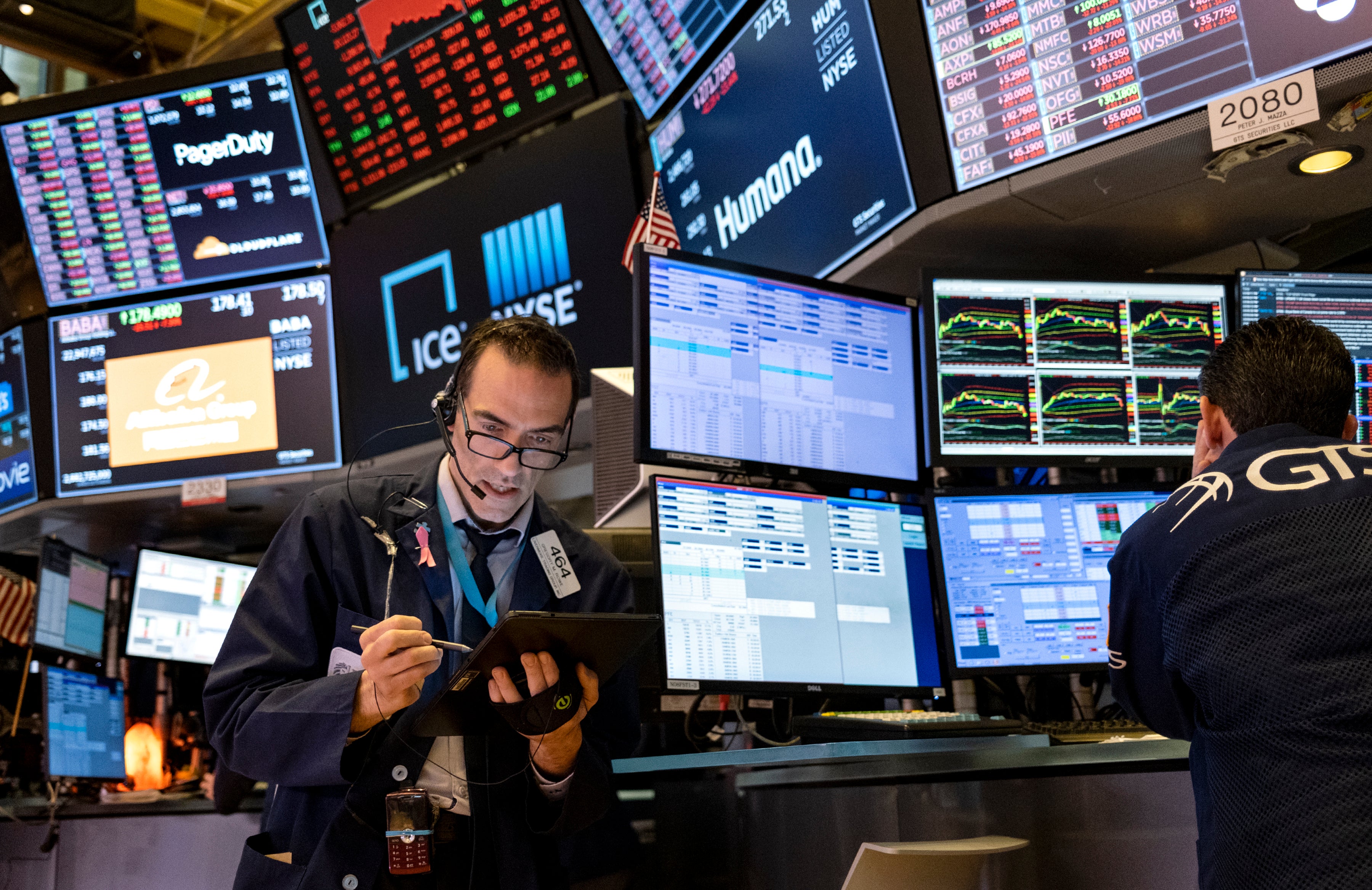Stocks drop after President Trump calls off stimulus talks
Stocks
dropped on Wall Street Tuesday after President Donald Trump ordered a
stop to negotiations with Democrats on a coronavirus economic stimulus
bill until after the election.
The S&P 500 index slid 1.4% after having been up 0.7% prior to the president’s announcement,
which he made on twitter about an hour before the close of trading. The
late-afternoon pullback erased most of the benchmark index’s gains from
a market rally a day earlier.
In a series of tweets, Trump said:
“I have instructed my representatives to stop negotiating until after
the election when, immediately after I win, we will pass a major
stimulus bill that focuses on hardworking Americans and small business.”
He also accused Speaker Nancy Pelosi of not negotiating in good faith.
The comments from the president came just hours after Federal Reserve Chair Jerome Powell urged Congress
to come through with more aid, saying that too little support “would
lead to a weak recovery, creating unnecessary hardship for households
and businesses.”
Optimism that Democrats and Republicans would
reach a deal on more stimulus ahead of the Nov. 3 elections had helped
lift the stock market recently. Now, investors face the prospect that
more aid may not come until next year, after the new Congress is seated,
said Willie Delwiche, investment strategist at Baird.
“This isn’t
just pushing it off until after the election, this realistically is
pushing it off until spring,” Delwiche said. “I don’t think this is just
a one-day financial markets reaction. This really goes to the health of
the recovery.”
The S&P 500 fell 47.66 points to 3,360.97. The
Dow Jones Industrial Average dropped 375.88 points, or 1.3%, to
27,772.76. It had been up by more than 200 points. The Nasdaq composite
lost 177.88 points, or 1.6%, to 11,154.60. The tech-heavy index had been
on pace for a 0.5% gain before Trump cut off the stimulus talks.
Small
stocks also fell, but less than the rest of the market. The Russell
2000 index of small-cap stocks gave up 4.67 points, or 0.3%, to
1,577.29.
Stocks had been drifting between small gains and losses
for much of the day before gaining momentum into the late afternoon,
then Trump’s tweets knocked the market into reverse gear.
The move
to nix the negotiations with Democrats dashes Wall Street’s hopes that
another round of stimulus would soon be on the way. Bitter partisanship
on Capitol Hill has been preventing a compromise on more aid for the
economy, which has been punched into a recession by shutdowns related to
the coronavirus pandemic. Reports on the economy have been mixed
recently, as some areas show a slowdown after extra unemployment
benefits and other stimulus earlier approved by Congress expired.
Powell
has repeatedly urged Congress to provide additional aid, saying the Fed
can’t prop up the economy by itself, even with interest rates at record
lows. “The expansion is still far from complete,” Powell said in a
speech to the National Association for Business Economics, group of
corporate and academic economists.
Without more stimulus,
economists expect that growth will slow significantly in the final three
months of the year. Last month, Goldman Sachs slashed its forecast for
growth in the fourth quarter to just 3% at an annual rate, down from a
previous forecast of 6%, because they no longer expected an aid package
to be approved. That would leave the U.S. economy 2.5% smaller at the
end of 2020 than a year earlier, even after a large rebound in the
July-September quarter.
“You’re going to see quite a significant
drag on growth,” said Gregory Daco, chief U.S. economist at Oxford
Economics, a consulting firm. It “would really risk a double-dip
recession.”
The stimulus cutoff coincides with a slowdown in
hiring, as employers added 661,000 jobs in September, the government
said Friday. That was down from 1.5 million in August and 1.8 million in
July.
The market’s slide comes a day after the S&P 500 posted
its best day in more than three weeks. Other stock markets around the
world made mostly modest gains. Longer-term Treasury yields veered lower
after Trump’s remarks. They had earlier been hanging close to their
highest levels in months.
Tuesday’s selling was widespread, led by
technology stocks and companies that rely on consumer spending.
Utilities were the only gainers among the 11 sectors in the S&P 500.
A report on Tuesday showed that U.S. employers advertised slightly fewer job openings in August than the prior month. But the number was nevertheless better than economists expected.
Trading on Wall Street has gotten shakier recently as investors contend with a long list of uncertainties, from Trump’s COVID-19 diagnosis to waxing and waning expectations about Congress’ ability to deliver another round of stimulus for the economy.
The
S&P 500 jumped 1.8% on Monday after Trump said he’s returning to
the White House to complete his recovery from the coronavirus, though
his medical team said he’s not yet fully “out of the woods.”
Several
big challenges lie ahead of markets. Chief among them is the
still-raging pandemic, as so clearly illustrated by Trump’s stay in the
hospital. The worry is that a ramp-up in infections could cause
governments to bring back some of the restrictions they put on
businesses early this year, which sent the economy hurtling into a
recession.
“We’re on the eve of earnings season and people are
reasonably undecided as to whether the correction that started in
September has further to run,” said Julian Emanuel, BTIG chief equity
and derivatives strategist.
The upcoming election also still means
a host of uncertainty about tax rates and regulations on businesses,
while tensions between the United States and China continue to simmer.
The
yield on the 10-year Treasury note fell to 0.75% from 0.78% late
Monday. While that’s still very low, the yield has been generally
climbing since dropping close to 0.50% in early August.
European and Asian markets closed higher.
AP Business Writers Christopher Rugaber and Elaine Kurtenbach contributed.



